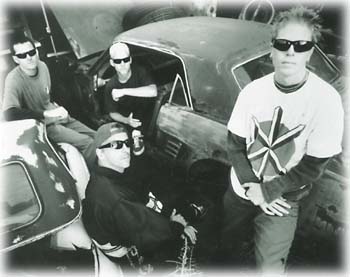![[Metroactive Music]](/music/gifs/music468.gif)
![[Metroactive Music]](/music/gifs/music468.gif)
[ Music Index | Metro | Metroactive Central | Archives ]
Esteem Players
Change the World: Orange County's Offspring want their teen fans to adopt some radically positive new virtues.
The Offspring still think that life is worth living on 'Ixnay on the Hombre'
By Gina Arnold
IN 1994, the Offspring record Smash sold eight and one-half million copies, thereby becoming one of the bestselling albums ever on an independent label. This fact is often characterized as a surprising event in the history of rock, but few bands have been as consistently able to translate the feelings of teenagers into a sentient, focused and even positive way as this 10-year-old Orange County punk-pop band.
Besides, although the band is hardly a wellspring of creativity, the Offspring possess certain attributes bound to please their constituency: kids. First of all, singer Bryan (Dexter) Holland has a great punk-rock voice, and his clear, youthful timbre sounds great at shout-level. Second, his lyrics are right on the money regarding the petty frustrations of teenage life. And lastly, the Offspring have kept a firm grip on the melodious aspect of their genre.
These three things remain firmly at the front of Ixnay on the Hombre (Sony-Columbia), the band's fourth album, and the result is an ultrastrong follow-up to Smash. True, with its chanted choruses and swift, anthemic melodies, Ixnay on the Hombre is a bit formulaic; the Offspring aren't branching out musically any from Smash. But that's probably a good thing.
The band's energy level is still uniformly high, and its message--that life's a learning experience, and well worth living--is both unusual in punk circles and irresistible. What remains to be seen is whether "the kids" are in the mood for what can, on close inspection, sound like one long 12-step or self- esteembuilding program. (The band's biggest hit, after all, was called "Self-Esteem.")
The Offspring actually evince a slight bent toward preachiness, and the new album begins with a rant by Jello Biafra, in which the former Dead Kennedy blasts parental warning labels and announces that "this album contains exclusive depiction of things that are real. These real things are commonly known as 'life!' So if it sounds sarcastic, don't take it seriously; if it sounds dangerous, don't try this at home; and if it offends you, just don't listen to it!"
The irony of this disclaimer is that Ixnay on the Hombre is one of the kinder, gentler albums on the market. The band often sounds almost Christian in its zealous espousal of positive values, but in truth, the Offspring are probably governed by the creed of snowboarders--a hobby that also instills a certain appreciation of the thrill of living life.
Thus, on songs like the "Meaning of Life" and "I Choose," the Offspring advocate thinking for yourself rather than blindly following your peers. The latter is easily one of the best songs on the record. "Life ... what a playground if we choose," announces Holland, "and I choose."
EVEN THE less catchy songs are upbeat. The pro-true-love number "Me & My Old Lady," for example, includes a chorus that emphatically states, "She ain't no ball and chain! She ain't no ball and chain!"
"Way Down the Line" comments on the repetitive nature of family problems like alcoholism and teenage pregnancy, with a final warning that "the world you get is the one you give away." And on "Change the World," Holland trashes punks who talk big about politics but who don't put their money where their mouth is: "You don't want to change the world like you say, you're just in it for yourself."
Change, in fact, is the subtext of every song on here. In "Cool to Hate," Holland mocks kids who think it's uncool to be positive. "I hate teachers, I hate school, I hate the cheerleaders and anyone who's cool," sings Holland (who, incidentally, holds a Ph.D. in microbiology), adding sarcastically, "I like to hate 'cos then I don't have to change."
The Offspring also celebrate nerdom--a popular stance in mid-'90s rock, as evidenced by Green Day, Weezer and others--and they try to sound tough by saying "fuck" a lot. Musically, the Offspring's main drawback is one of dynamics--they have none. Also, the beat of every song but one is exactly the same, and the one exception, "Don't Pick It Up," is rote ska, a la the Rugburns or Sublime.
But the age that will be impressed by this band's vision isn't likely to notice the sameness of its repertoire, and certainly it would all sound great live. In fact, contrary to Biafra's warning, Ixnay on the Hombre ought to have a label saying that the content is extremely suitable for younger listeners, but may bore more sophisticated listeners with its simple maxims, chords and riffs.
[ Metro | Metroactive Central | Archives ]
This page was designed and created by the Boulevards team.

F. Scott Schafer
From the February 6-12, 1997 issue of Metro